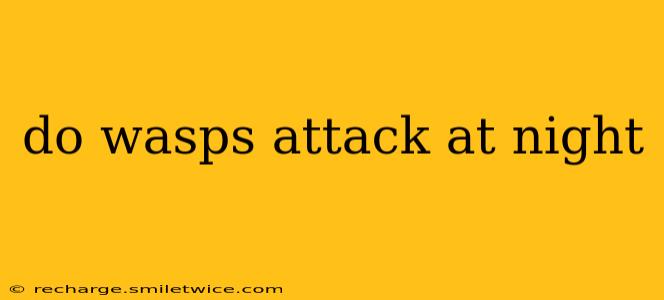Do Wasps Attack at Night? Unraveling the Nocturnal Habits of Wasps
The question of whether wasps attack at night is a common one, sparking curiosity and concern among many. The simple answer is: generally, no, wasps do not actively attack at night. However, the situation isn't entirely black and white. Understanding the nocturnal behaviors of different wasp species is crucial to fully answering this question.
Most wasp species are diurnal, meaning they are active during the day. Their activity relies heavily on sunlight for navigation, foraging, and regulating their body temperature. At night, their metabolism slows, and their vision is significantly impaired. This makes them less likely to be aggressive and much less able to effectively hunt or defend themselves.
What About Those Nighttime Encounters?
While unlikely, there are certain circumstances where you might encounter an aggressive wasp at night. These aren't typical attacks, but rather instances where a wasp might sting defensively if provoked:
- Disturbed nests: If a wasp nest is accidentally disturbed at night—for instance, by someone walking near it or unintentionally brushing against it—the wasps inside might react defensively and sting. This isn't a deliberate attack, but rather a protective response. Nighttime nests are often more vulnerable as the wasps are less active.
- Attracted to light: Some wasp species might be drawn to artificial light sources at night, particularly porch lights or other bright outdoor illumination. This doesn't mean they're actively hunting, but simply drawn to the light. If you swat at one, it could sting in self-defense.
- Individual wasps seeking shelter: A lone wasp seeking shelter in a protected area, such as inside a house or garage, might sting if it feels threatened. This is an individual response, not a coordinated attack.
What Types of Wasps Are More Likely to Be Active at Night?
While most are diurnal, some nocturnal wasp species do exist. However, these are less common and generally less aggressive than their daytime counterparts. Identifying a specific nocturnal wasp species would require detailed knowledge of entomology and location.
How to Minimize Nighttime Wasp Encounters
To minimize the risk of encountering wasps at night:
- Keep outdoor lighting to a minimum: Reducing bright outdoor lights reduces the chances of attracting wasps to your property.
- Inspect areas before sitting or sleeping outdoors: A quick check of your surroundings, especially near potential nesting sites, can prevent accidental disturbances.
- Seal up any entry points into your home: This prevents wasps from seeking shelter indoors.
- Avoid swatting at wasps: This will likely provoke them to sting, regardless of the time of day.
Are Wasps More Aggressive at Certain Times of Day?
While night-time attacks are rare, wasp aggression tends to peak during the hottest parts of the day, particularly in late summer and early autumn when resources are scarce. This is when they are most likely to be actively foraging and defending their nests.
Do Wasps Sleep?
Wasps don't sleep in the same way humans do. Their activity levels decrease significantly at night, and they become less responsive to stimuli. They enter a state of reduced activity, conserving energy.
In conclusion, while wasps are rarely aggressive at night, it's crucial to remain cautious and avoid disturbing nests or provoking individual wasps at any time. Understanding their behavior can help minimize the risk of stings.
